Amy Neftzger's Blog, page 10
December 11, 2012
Cooking with Dexter

I loved the book Darkly Dreaming Dexter and the TV show based on the book is one of my favorites to watch. So I thought I would start a series of posts on what it would be like if Dexter were a chef. This way I can also share some of my favorite recipes.
Today we’re making a roasted chicken. You will need to purchase a whole “roasting” chicken. These look like little turkeys. Most grocery stores sell them, but if you don’t see any in the meat department you may need to check with the butcher.
Once you have your chicken we’re ready to get started.
Step One:
Preheat the oven to 350 degrees.
Step Two:
Cover the kitchen counter with sheets of plastic.
Step Three:
Strap a whole roasting chicken down using duct tape. Place a nice sized piece over the hole in the neck to symbolize sealing the bird’s mouth to stifle screams.
Step Four:
Select and sharpen an extremely large carving knife and cleaver. Set the cleaver aside.
Step Five:
Using both hands, face the chicken and raise the carving knife above your head.
Step Six:
Recite a list of all the wrongs the chicken has committed. Look the chicken in the eyes.
Step Seven:
Swiftly drive the knife into the left breast of the chicken where the heart should be.
Step Eight:
Using the cleaver, cut the chicken into pieces, slicing through bones, as needed. If you happen to have a bone saw on hand, use that instead of the cleaver.
Step Nine:
Place the segments of chicken into little trash bags and seal them with twist ties. Make sure that the body is evenly dispersed between all the trash bags and squeeze out any excess air so that the bags don’t float.
Step Ten:
Haul the bags out to sea in your boat and drop them into the ocean.
Step Eleven:
Turn the oven off and go out for dinner.
I feel a sense of release after cooking like this. Now I can go out and buy donuts for everyone, smile and act normal until I feel the urge to cook again.
Published on December 11, 2012 09:18
December 4, 2012
Darrell A. Harris on Skinny Dipping
About a month ago I reviewed the book Skinny Dipping in Daylight by Cory Basil. I then passed the book along to my friend Darrell A. Harris, who I thought would really enjoy it. He did. Darrell wrote such a wonderful review that I thought I would share it with you here. If you're not familiar with Darrell and his work, please read his short biography at the end of the review. He's no stranger to the arts and maybe that's one of the reasons we get along so well.
A Review of Skinny Dipping in DaylightbyDarrell A. Harris

Poet Cory Basil tells us in his introduction to his fine volume Skinny Dipping in Daylight “the seasons of the soul and spirit do not follow those of the solstice and equinox.” How fortunate I am to have read this vulnerable and elegant work by one who minded and kept the seasons of the soul and spirit.
He observes late in the book “Poetry does not pay. But I need it and so do you.” Brother Basil is spot-on about the second two observations. And while I understand what he’s saying in the first, I would definitely take issue with him on it. His poetry has already yielded him the soul equilibrium that eludes so many. Rare coinage indeed. And now his willingness to share it with others allows us to be enriched by it too.
This racehorse of a poet comes out of the chute full throttle. The poem Blue Manifesto sets the tone of the journey with world-weary yet whimsical wisdom: “I know what I need needs me not, I know what I want wants me not.” And shortly thereafter in Abandoned Drifter he boldly petitions: “Spit me out of the whale. Part me a Red Sea then show me dry land.”
And with the mention of a whale, I should interrupt myself right here and say this volume is a whale of a bargain. I’m used to paying a small fortune for slim volumes of poetry I care about. These poems make me care deeply. And there are nearly 500 pages of deep and moving reflection. (I probably should quickly add I am not being paid to tell you that, lest you think I am wrongly motivated.) O.K. Back to business.
In the poem These Strange Days Mr. Basil chronicles the hollowness in the aftermath of the holocaust of personal loss. Then Hiding the Hyde confides the stewing bewilderment of the perplexed Jekyll in everyman. With Scrapbook and Tape reveals reverie about “how one’s deadly imagination fills the blanks between the frames.” We are so dishonest with ourselves. And so irresolute. In Jet Black Hair our confessor writes: You held tightly, and I let go far too soon.” These ruminations on the how and the why of lost love bring illumination rather than despair, peace rather than angst.
The soundtrack of young love (all loves have a soundtrack) is contemplated in The Year Oasis Owned my Discman. Already Stranger lets us observe the poet’s euphoria of new love, followed by the pointless pain of ensuing freefall ala Gotye’s Someone That I Used to Know.
We also get perceptive insight into the therapeutic nature of writing. Brenda Euland says in her 1930s classic If You Want to Write that everyone can and should write. In Basil's book he says, “I can always go back to my writing; it never rejects – It looks at me fearfully and wonders if I will abandon it. But I won’t – It’s too easy. It’s cheating the noise, a free pass to sanity, an excuse to live.”
This world would be a kinder, gentler place if we all took the time and effort to process our loves and losses, vitriol and victories on the page before moving on to the next thing. That’s what is so engaging and even hopeful about Mr. Basil’s generous contribution of Skinny Dipping in Daylight.
I should also add that I just gotta love a poet who listens to Vanessa Paradis and reads Thomas Merton. His thoughtfully chosen influences doubtless spur him on to the elegance of this work . . . Neruda fueling his “lust for love” and Bukowski helping him “keep it honest, simple and straight.” Would to God that more of our contemporary artists had such refined, eclectic and exceptional taste.
In the latter part of Skinny Dipping in Daylight we are treated to a number of journal entries. These are like coveted bonus tracks on a deluxe collector’s edition CD box. They help us put these slices of the poet’s soul in the context of life as we all live it. And he says so sweetly: “Somewhere in my soul I pray it” (his writing) “touches another – I find the loneliness of poetry to be a comfort.” And comforting as well as illuminating, it truly is.
May I also add that Cory Basil’s provocative title does not portend an ill- advised burst of emotional and psychological exhibitionism? Rather, this book is a confident and trusting confession after much pain and loss. He probably has earned the right to rant. But he limits himself to only a couple brief flashes. They seem well deserved. And they end up seeming like essential peppery seasonings in a deliciously savory and nutritious dish.
Additional note: Skinny Dipping in Daylight releases today. You can order autographed copies through Cory's website at hereliescorybasil.com

A Review of Skinny Dipping in DaylightbyDarrell A. Harris

Poet Cory Basil tells us in his introduction to his fine volume Skinny Dipping in Daylight “the seasons of the soul and spirit do not follow those of the solstice and equinox.” How fortunate I am to have read this vulnerable and elegant work by one who minded and kept the seasons of the soul and spirit.
He observes late in the book “Poetry does not pay. But I need it and so do you.” Brother Basil is spot-on about the second two observations. And while I understand what he’s saying in the first, I would definitely take issue with him on it. His poetry has already yielded him the soul equilibrium that eludes so many. Rare coinage indeed. And now his willingness to share it with others allows us to be enriched by it too.
This racehorse of a poet comes out of the chute full throttle. The poem Blue Manifesto sets the tone of the journey with world-weary yet whimsical wisdom: “I know what I need needs me not, I know what I want wants me not.” And shortly thereafter in Abandoned Drifter he boldly petitions: “Spit me out of the whale. Part me a Red Sea then show me dry land.”
And with the mention of a whale, I should interrupt myself right here and say this volume is a whale of a bargain. I’m used to paying a small fortune for slim volumes of poetry I care about. These poems make me care deeply. And there are nearly 500 pages of deep and moving reflection. (I probably should quickly add I am not being paid to tell you that, lest you think I am wrongly motivated.) O.K. Back to business.
In the poem These Strange Days Mr. Basil chronicles the hollowness in the aftermath of the holocaust of personal loss. Then Hiding the Hyde confides the stewing bewilderment of the perplexed Jekyll in everyman. With Scrapbook and Tape reveals reverie about “how one’s deadly imagination fills the blanks between the frames.” We are so dishonest with ourselves. And so irresolute. In Jet Black Hair our confessor writes: You held tightly, and I let go far too soon.” These ruminations on the how and the why of lost love bring illumination rather than despair, peace rather than angst.
The soundtrack of young love (all loves have a soundtrack) is contemplated in The Year Oasis Owned my Discman. Already Stranger lets us observe the poet’s euphoria of new love, followed by the pointless pain of ensuing freefall ala Gotye’s Someone That I Used to Know.
We also get perceptive insight into the therapeutic nature of writing. Brenda Euland says in her 1930s classic If You Want to Write that everyone can and should write. In Basil's book he says, “I can always go back to my writing; it never rejects – It looks at me fearfully and wonders if I will abandon it. But I won’t – It’s too easy. It’s cheating the noise, a free pass to sanity, an excuse to live.”
This world would be a kinder, gentler place if we all took the time and effort to process our loves and losses, vitriol and victories on the page before moving on to the next thing. That’s what is so engaging and even hopeful about Mr. Basil’s generous contribution of Skinny Dipping in Daylight.
I should also add that I just gotta love a poet who listens to Vanessa Paradis and reads Thomas Merton. His thoughtfully chosen influences doubtless spur him on to the elegance of this work . . . Neruda fueling his “lust for love” and Bukowski helping him “keep it honest, simple and straight.” Would to God that more of our contemporary artists had such refined, eclectic and exceptional taste.
In the latter part of Skinny Dipping in Daylight we are treated to a number of journal entries. These are like coveted bonus tracks on a deluxe collector’s edition CD box. They help us put these slices of the poet’s soul in the context of life as we all live it. And he says so sweetly: “Somewhere in my soul I pray it” (his writing) “touches another – I find the loneliness of poetry to be a comfort.” And comforting as well as illuminating, it truly is.
May I also add that Cory Basil’s provocative title does not portend an ill- advised burst of emotional and psychological exhibitionism? Rather, this book is a confident and trusting confession after much pain and loss. He probably has earned the right to rant. But he limits himself to only a couple brief flashes. They seem well deserved. And they end up seeming like essential peppery seasonings in a deliciously savory and nutritious dish.
About Darrell
Dr. Darrell A. Harris co-founded Star Song Records in 1976. He was its President for twenty years, serving as Executive Producer for multiple recordings by Newsboys, Twila Paris, Gaithers, Petra and many others.
In the early ‘90s Dr. Harris was Executive Editor of The Complete Library of Christian Worship (Robert E. Webber, ed.) He now serves as Dean of the Chapel to the Robert E. Webber Institute for Worship Studies, and as a Trustee of the Gospel Music Trust Fund.
Harris resides with Janet, his wife of forty-three years in Franklin, Tennessee. They have two daughters and six grandchildren.
Additional note: Skinny Dipping in Daylight releases today. You can order autographed copies through Cory's website at hereliescorybasil.com
Published on December 04, 2012 05:47
November 27, 2012
Pick Up Lines That Aren’t
Have you ever been in that situation where a stranger walks up to you and makes a statement that sounds odd, but then you assess the context and realize that the person meant something completely different and more conventional? This seems to happen to me a lot.
In any event, all of the statements below are things that people have actually said to me. Each of these expressions could be considered as a pick-up line and, in some cases, I thought it was until I learned the full context of the comment.
1. “Excuse me, but didn’t I marry you?”
These were the first words a stranger said to me at a party. When he approached me this way, I first thought he was a lunatic. Turns out the guy was a judge and he thought I had been the bride at a ceremony he performed.
2. “I checked you out at the library.”
He was referring to one of the books I’ve written. He had never seen me in person before.
3. “You look hot.”
I have very sensitive fair skin and get flushed easily when I drink things like wine or coffee or just breathe air. However, no matter who says this to me I still take it as a compliment every time and graciously thank the person. Usually at that point, the person becomes embarrassed and tries to avoid me. At my age I don’t really care what they meant. I only care what I heard.
4. “Will you please do me?”
When my husband said this to me I got very excited and screamed “#$%@ YES!” right in front of the kids. Turns out he only wanted me to put sunscreen on his back.
It’s been said that timing is everything, but context is pretty important, too. Well, it’s only important if your goal is to be understood.

In any event, all of the statements below are things that people have actually said to me. Each of these expressions could be considered as a pick-up line and, in some cases, I thought it was until I learned the full context of the comment.
1. “Excuse me, but didn’t I marry you?”
These were the first words a stranger said to me at a party. When he approached me this way, I first thought he was a lunatic. Turns out the guy was a judge and he thought I had been the bride at a ceremony he performed.
2. “I checked you out at the library.”
He was referring to one of the books I’ve written. He had never seen me in person before.
3. “You look hot.”
I have very sensitive fair skin and get flushed easily when I drink things like wine or coffee or just breathe air. However, no matter who says this to me I still take it as a compliment every time and graciously thank the person. Usually at that point, the person becomes embarrassed and tries to avoid me. At my age I don’t really care what they meant. I only care what I heard.
4. “Will you please do me?”
When my husband said this to me I got very excited and screamed “#$%@ YES!” right in front of the kids. Turns out he only wanted me to put sunscreen on his back.
It’s been said that timing is everything, but context is pretty important, too. Well, it’s only important if your goal is to be understood.
Published on November 27, 2012 09:38
November 20, 2012
A Season of Thankfulness
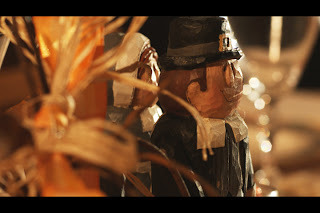 A lot of people are doing “30 Days of Thankfulness” and listing one thing for which they’re thankful each day during the month of November. While some people find this boring, I think it’s a great exercise in remembering how we have so much to be thankful for.
A lot of people are doing “30 Days of Thankfulness” and listing one thing for which they’re thankful each day during the month of November. While some people find this boring, I think it’s a great exercise in remembering how we have so much to be thankful for.However, instead of listing 30 individual items or specific people, I thought I’d list the top 5 things for which I’m thankful right now.
1. The little things. Because so often little things turn out to be really big things. Like the smile from a stranger when you’re having the worst day of your life.
2. People who take the time to help other people even when they don’t really have the time to do so. The truth is that we’re all busy, but some people stop their hectic schedules long enough to put other people first. I’m thankful for these people.
3. That the past is gone. I’ve learned a few things and had some fun, but I don’t ever want to live in my past. I believe it’s almost always the quickest road to death.
4. The love of a good dog. While I love people, no one else thinks I’m wonderful after a two hour workout. My dog thinks I’m awesome no matter how much I stink and she’s not afraid to cuddle up with me. I think we humans could learn a lot about love from dogs.
5. Art in all forms. Nothing is more powerful or more beautiful than art done well. It has the potential to change the world or one person’s world forever. Literature, paintings, sculpture, photographs, dance, music, etc. The forms of art are as limitless as the potential because art can speak intellectually, emotionally and spiritually. Art may be the one universal language because of this.
This is my list. Yours may be different and that’s okay. But I think that if we could all experience a little of each of these things every day I think we’d see the beauty in life and remember to be thankful more often.
Published on November 20, 2012 10:42
November 7, 2012
Skinny Dipping In Daylight - Book Review
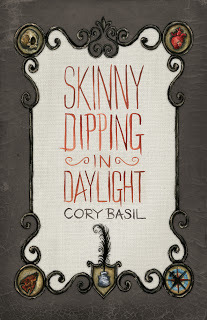 People who know me well know that words are my drug of choice. I have other addictions, such as good coffee, red wine and visually stunning movies, but I could walk away from any of these, with the exception of well-placed words. I have deep appreciation for well crafted ideas, especially when these ideas are expressed verbally. Skinny Dipping in Daylight by Cory Basil is a beautifully crafted work that will appeal to readers like me.
People who know me well know that words are my drug of choice. I have other addictions, such as good coffee, red wine and visually stunning movies, but I could walk away from any of these, with the exception of well-placed words. I have deep appreciation for well crafted ideas, especially when these ideas are expressed verbally. Skinny Dipping in Daylight by Cory Basil is a beautifully crafted work that will appeal to readers like me.The title reflects the raw honesty of the book’s content. The pieces are thoughtful and accurately reflect the different facets of human experience: Love, humor, pain, struggle, falling and getting back up again. Poetry has rhythm and good poetry reflects the rhythm of life, like Skinny Dipping in Daylight.
Even in the prose sections Cory has a very lyrical style of writing, and yet it often contains pithy aspects or whimsical elements that keep me engaged. The words he chooses eloquently support his message without clouding it or overtaking it and that’s what makes his writing so appealing.
I could write paragraphs about the book to describe the writing and illustrations, but I think your time would be better spent reading it for yourself. Check out Cory’s description in the video trailer and then go buy a copy. Better yet, read it with friends or a reading group so you can talk about it with someone else. The discussion time will be well-spent.
Lastly, for those of you unfamiliar with Cory’s artwork, please take the time to check out the links below. He is as imaginative as he is articulate. In fact, I was so impressed with his work that I own several of his prints and also hired him to do the cover for my next book.
Related Links:
Cory’s Website
Cory's Artwork on Etsy
If you live in Nashville, please visit The Frothy Monkey coffeehouse on 12th Ave. and check out Cory’s original art work which will be there on display from December 1 through January 31, 2013. But get there before everything’s purchased and there’s nothing left to see.
Note: My review was based on a free, advanced-review copy of the book.
Published on November 07, 2012 05:13
October 30, 2012
I’m Not Prejudiced. I Just Don’t Like Commas.
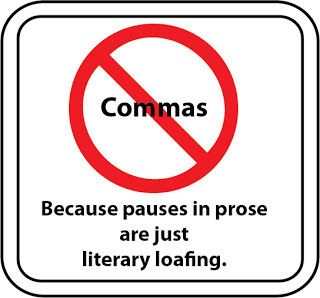
I recently received a draft of one of my manuscripts back from my editor. While he hasn't gotten on my case for using the word "that" too frequently, I did notice that most of the edits were to insert commas where I had left them out.
So in my defense, I’d like to clarify something:
I’m not prejudiced against commas. But I do have certain beliefs.
For example, I don’t believe that commas and other punctuation should mix in the same sentence. Commas should be allowed to exist in separate but equal sentences but other punctuation should not be forced to mix with them.
Furthermore, when commas and periods get together, the period should always be on top. This is what God intended and this union is referred to as a “semicolon.” Notice that a full colon, the stronger form of punctuation, is two periods. I don’t know what God was thinking there, but I’m sure He had a good reason for it, as commas were completely left out of the mark. Besides, Vonnegut hated semicolons, also.
I’ve also noticed that commas occasionally think too much of themselves. They get lofty ideas and turn into apostrophes. Even worse, sometimes these self-important bits of punctuation join together into pairs and become quotation marks. This is not natural. They are rising above their place in life and should be stopped.
I don’t hate commas. In fact, they're sometimes necessary. But they invade paragraphs, even when they’re unwanted. Just look at this blog post. They’re everywhere.
Published on October 30, 2012 11:06
October 23, 2012
The Truth About Tattoos
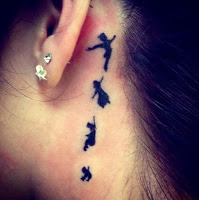 I recently read a book by Terry Pratchett called “Nation” in which an older man initially doesn’t trust a young boy because the boy doesn’t have enough tattoos. In that culture, tattoos mark significant life events and growth experiences, so a person’s wisdom can be easily gauged by the amount of ink on the person’s body.
I recently read a book by Terry Pratchett called “Nation” in which an older man initially doesn’t trust a young boy because the boy doesn’t have enough tattoos. In that culture, tattoos mark significant life events and growth experiences, so a person’s wisdom can be easily gauged by the amount of ink on the person’s body.So this got me thinking ... Why do some people have a prejudice against individuals with tattoos and view them as shifty or unreliable? I don’t think the view is accurate, so I’d like to set forth a few arguments against this perspective as food for thought.
First of all, I’d like to point out that the average tattoo lasts longer than the average marriage. This is a key point because it demonstrates that people with tattoos know how to make a commitment. Are you looking for a partner for the long haul? An employee who isn’t going to quit easily? Look for someone with a tattoo.
Secondly, getting a tattoo can be extremely painful. This tells me that these people can tolerate uncomfortable situations and will stick it out when others might quit. They can endure under pressure and keep their eye on the goal.
In addition, when people tell me that individuals with tattoos are unreliable, I simply laugh. Reliable is a synonym for consistent. Who would you rather trust: someone who wears the same image day after day on their skin (i.e., is consistent) or someone who changes their clothes, makeup and jewelry to appear different all the time (i.e., projects an inconsistent look)? No contest.
Finally, I’m willing to bet that very few of our politicians have tattoos and I don’t think any of us believe that they’re doing a great job. Perhaps if we elected more individuals with tattoos our country would be in better shape. At least we could learn who we were really voting for because most people with tattoos make sure that the images they permanently mark on their bodies reflect what they believe in.
Based on my conclusions, I think that people with tattoos make better employees, spouses, citizens, and (probably) elected officials.
Maybe some people without tattoos feel threatened by those who have them because people with tattoos are just better people. By the way, I don’t have any tattoos, so you may not want to trust me on this.
Published on October 23, 2012 09:47
October 17, 2012
THATman
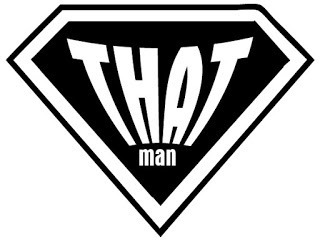 I was talking with another writer about editors and he said that his editor is always striking the word “that” from his drafts. So I’ve come up with the perfect solution:
I was talking with another writer about editors and he said that his editor is always striking the word “that” from his drafts. So I’ve come up with the perfect solution:Write a graphic novel about a super hero named THATman!
Who is THATman?THAT hero THAT is like THAT other hero THAT rhymes with THATman THAT also wears a cape and THAT fights THAT other kind of evil whereas THATman fights THAT oppression THAT evil editors inflict and THAT uses the word THAT as much as THAT can be done in a book about THAT subject.
Subtitled:
"How to passive aggressively get even with your editor through character definition."
The goal is obviously to cram as many “thats” on a page as possible because of the way THATman speaks and operates. But the editor can’t take them out because it’s part of who the character is. Brilliant!
THATman will also need a side kick called THATguy. He sticks out wherever he goes because he’s always saying the wrong things at the wrong time and embarrassing himself and his friends. He works as a decoy for THATman by distracting nearby people through his dumbassery (real word, FYI, since I spoke it into existence here). At parties and other events people look at THATguy's foolishness and say, “I wouldn’t want to be THAT guy). Meanwhile, no one sees THATman triumphantly place another THAT somewhere on a manuscript...
I’m seeing this as a series.
Episode One: THATman Begins
Episode Two: THAT Dark Knight
Episode Three: THAT Dark Knight Rises to Superscript
Episode Four: Comma Abuse is Morally Justified (even when the text isn’t).
Episode Five: Participles Dangling Over the Edge of Infinitives
I’m sure there’s more. But I just love THAT idea.
Published on October 17, 2012 10:53
October 10, 2012
The View From The Tangent
Telling me not to go off on tangents is like telling me that I can’t go home. Because I live on the tangents. That’s where all the interesting things are because they haven’t been trampled underfoot by all the people on the road of common thoughts.
I realize that there’s a place for the conventional. It serves a purpose. But not everyone needs to be there. People like me make life more interesting.
For Example, your meetings may be more productive, but my meetings are more entertaining. People actually like coming to my meetings and things still get done. However, these things are not always done in the way that you’re used to seeing them done.
Furthermore, the tangent is where all the good ideas exist. People like me are brave enough to walk out there and harvest these ideas and we don’t mind doing the work because we were made for it. Don’t forbid people who are comfortable out on the edge the ability to go there. If Thomas Edison hadn’t gone there you’d still be reading by candlelight.
New ideas can change the world. They can make us laugh. Don’t be afraid of creativity. People like me are only dangerous when you restrain us. So let us wander out to the edges of thought. It frees up space in the main thought pool for the rest of you swimming there.
Finally, some people have told me that because I think differently and enjoy life that I don’t take it seriously enough. To those individuals I have only one final thing to say:
Dance to the music while you still can, people. Because some of you are choosing to make yourselves deaf.
I realize that there’s a place for the conventional. It serves a purpose. But not everyone needs to be there. People like me make life more interesting.
For Example, your meetings may be more productive, but my meetings are more entertaining. People actually like coming to my meetings and things still get done. However, these things are not always done in the way that you’re used to seeing them done.
Furthermore, the tangent is where all the good ideas exist. People like me are brave enough to walk out there and harvest these ideas and we don’t mind doing the work because we were made for it. Don’t forbid people who are comfortable out on the edge the ability to go there. If Thomas Edison hadn’t gone there you’d still be reading by candlelight.
New ideas can change the world. They can make us laugh. Don’t be afraid of creativity. People like me are only dangerous when you restrain us. So let us wander out to the edges of thought. It frees up space in the main thought pool for the rest of you swimming there.
Finally, some people have told me that because I think differently and enjoy life that I don’t take it seriously enough. To those individuals I have only one final thing to say:
Dance to the music while you still can, people. Because some of you are choosing to make yourselves deaf.
Published on October 10, 2012 10:03
October 2, 2012
Life Lessons From The Drum Show

 This past weekend I attended the Nashville Drum Show. If I had to describe this event in one word, it would be LOUD. Imagine a room with a cement floor, cinder block walls, tin roof, and hundreds of drums and drummers. Even the sales reps were wearing earplugs.
This past weekend I attended the Nashville Drum Show. If I had to describe this event in one word, it would be LOUD. Imagine a room with a cement floor, cinder block walls, tin roof, and hundreds of drums and drummers. Even the sales reps were wearing earplugs.It was difficult to talk during the show, but I did see some very nice things. Check out the beautiful work on the drums in the photos in this post.
However, no matter how beautiful the drum is, what matters most is the sound and it was difficult to hear anything clearly amid all the noise. It’s like trying to hear a conversation when there are a few hundred people shouting around you.
My husband and I talked when we left the show. He’s worked with a lot of drummers and he said that he’s found that some of them just hit as hard as they can and let the producer set the levels in the recordings (or sound guy in a live situation). Other drummers play according to the situation and adjust their volume to the size of the room, type of event, genre of music, and the people they’re playing with. In other words, some drummers pretty much do one thing: they’re very solid, lay down the beat, and let someone else make it fit. Other drummers are more collaborative in their approach and see making music as a team effort.
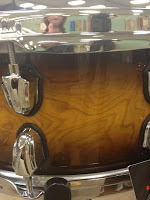 I think I’ve come across people who approach life from each of these perspectives, also. The ones who hit hard and let others sort it out have the ability to drive the song, but they also tend to leave a lot of broken pieces behind. The ones who adapt to the situation and adjust their playing accordingly have more friends. I don’t know if one approach is more valuable than the other, although I know which one I prefer. I know that sometimes what we need is a strong beat to help us keep going, but most of the time what we need are people who can work with us as collaborators. Those are the situations where life is most beautiful.
I think I’ve come across people who approach life from each of these perspectives, also. The ones who hit hard and let others sort it out have the ability to drive the song, but they also tend to leave a lot of broken pieces behind. The ones who adapt to the situation and adjust their playing accordingly have more friends. I don’t know if one approach is more valuable than the other, although I know which one I prefer. I know that sometimes what we need is a strong beat to help us keep going, but most of the time what we need are people who can work with us as collaborators. Those are the situations where life is most beautiful.


Published on October 02, 2012 10:01



